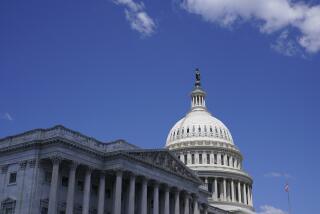Computers Have Created a National Data Bank
- Share via
Computers, the key weapons in the government’s war on waste and fraud, have created what Congress, civil liberties groups and public opinion polls have long opposed--a national data bank containing substantial personal information about most Americans, according to a study for Congress by the Office of Technology Assessment.
But rather than being an Orwellian central data bank that maintains computer records in one place--something like the National Data Center that was rejected by Congress more than a decade ago--this “de facto national data base” is created from hundreds of separate computerized record systems that can be reached over telephone lines by computers virtually anywhere in the country.
Computerized files that are subject to electronic inspection by government agencies vary from federal tax records to Social Security files, from state driver’s license records to private bank account statements.
Electronic Dossiers
And by searching out information on an individual through a variety of these computerized data banks, the study noted, it is possible today for government officials to compile electronic dossiers on millions of private citizens, raising concerns about constitutional standards of privacy and due process and the security and accuracy of data.
“Technological advances have opened up new possibilities for improving the efficiency of government record-keeping; the detection and prevention of fraud, waste and abuse; and law enforcement investigations,” the report said. But it also warned that the same technology increases the risk of “inappropriate, unauthorized or illegal access to and use of personal information.”
The 152-page report by the nonpartisan congressional research agency recommended that Congress consider new privacy protection legislation and the possible creation of a privacy commission to mediate conflicts. And it predicted that the number of conflicts would increase as government agencies increasingly turn to computerized record surveillance.
Computer Matching
More than a product of technological advances, the evolution of a national data bank also is the result of congressional and administrative actions authorizing increased use of computer matching and verification programs, particularly in welfare and law enforcement programs.
For example, in 1984 Congress authorized the release of federal income tax information--specifically data from W-2 forms and unearned income reported on 1099 forms--to any federal, state or local agency administering such programs as food stamps, unemployment compensation, supplemental Social Security, medical assistance and Aid to Families With Dependent Children. The information can be provided via computer.
Also, data banks are being established solely to facilitate such computer verification and matching efforts.
For example, the Department of Health and Human Services is compiling a data bank of the dead--identifying persons that Medicare has reported dead so that other departments will no longer send government benefit checks made out to them.
It is possible today to electronically mingle, merge and compare more than 3 billion records containing personal information held by various federal agencies alone, according to the report, which was prepared at the request of the Senate Governmental Affairs Committee and the House Judiciary Committee.
The system has become so extensive, the report said, that it is difficult for individuals to know what files about them exist, whether the information contained in those files is accurate and whether any information they may have supplied voluntarily to one agency for one purpose is being used by another agency for another purpose.
Selective Service computers, for example, are used to scan driver’s license records in most states to find 18-year-old males who have not registered for the draft. And county welfare officers can tap into computerized tax records, bank account records and credit bureau files to verify the income and asset claims of a food stamp applicant.
Jerry Berman, director of the American Civil Liberty Union’s privacy and technology project, said: “If Congress tried to introduce a bill to establish a central file on every citizen, it would go down to defeat, but this report shows that what couldn’t be done frontally has happened incrementally.”






